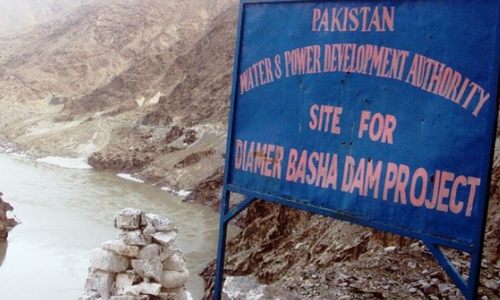ADB refuses to fund mega dam project

ISLAMABAD: The Asian Development Bank (ADB) on Wednesday declined to commit funds for the $14 billion Diamer-Bhasha dam project and called for governance reforms to encourage private investment and equitable growth for all Pakistanis.
“We did not really make any commitment. This is a very big project,” ADB president Takehiko Nakao said on Wednesday at a joint news conference with Finance Minister Ishaq Dar on the conclusion of the 15th ministerial meeting of the Central Asia Regional Economic Cooperation (CAREC) programme.
He said the United States Agency for International Development (USAID) was conducting a feasibility study on the Diamer-Bhasha dam, adding that while it was a very important project for Pakistan’s energy and irrigation requirements, it called for the formation of more partnerships that could provide funding for the project.
Read: Marketing Diamer-Bhasha dam
“We haven’t decided [whether to fund] this project yet because it needs big money,” he said, adding that the ADB might consider joining the financing of this project at a later date.
Bank’s chief says it may join the Diamer-Bhasha dam project at a later date
The ADB was originally seen by Pakistan as the lead financier of the strategic project, which would have a water storage capacity of over six million acre feet and a power output of 4,500MW. Repeated efforts to rope the World Bank in as a co-lender failed two years ago when the government declined to seek an NoC from India for the project.
Instead, Finance Minister Ishaq Dar accepted a funding offer from the World Bank to start the Dasu Hydropower project, downstream of Diamer-Bhasha, saying the government would simultaneously go ahead with both projects.
The ADB has been advising the government to adopt a professional approach towards the construction of the big dam that cannot be funded by a single institution, country or group given its mammoth financial requirements and the risks involved.
As a way out, the ADB had advised Islamabad to restructure the Diamer-Bhasha dam project by separating power generation, land acquisition and main dam structures and their various modes of financing.
To do that, the government engaged USAID for a feasibility study and is seeking investment from US investors to develop it as an independent power project (IPP). The government is providing funds for the land acquisition of the project through Public Sector Development Programme (PSDP) funds.
The ADB president said Pakistan’s successful completion of a multi-year IMF programme was encouraging, but added that the country still faced several challenges in maintaining its hard-earned gains. He said that deeper structural reforms in the energy sector should continue where smart metering was possible and public sector enterprises should be made more efficient so that private investors — both domestic and foreign — could be encouraged to come forward and contribute.
Mr Nakao stressed that it was very important for Pakistan to continue fighting against corruption, tax avoidance and money laundering, saying that the government should make efforts to minimise these menaces. He said the signing of a tax avoidance treaty with the Organisation of Economic Cooperation and Development (OECD) would greatly help in this regard.
Responding to a question, he said good governance was critical for improving spending on the safety and security of people and raising their living standards. The government should take corrective steps; the sooner, the better, he said.
Responding to another question on start-up problems in ADB-funded projects, he said the bank was currently providing on average $1.5 billion to Pakistan per year, but admitted that it was important to improve implementation standards for accelerated disbursement, timely construction and completion so that the benefits of these projects could reach the people.
He also asked Pakistan to wisely implement projects under the China-Pakistan Economic Corridor (CPEC) and utilise their funds well so as to avoid debt or repayment problems. He said the ADB supported regional integration efforts such as the CPEC because they ensured shared development.
Finance Minister Dar and the ADB chief also witnessed the signing of a $250 million loan-agreement on the ‘Regional Improvement of Border Services’ between Pakistan and ADB to improve border management facilities at Torkham, Chaman and Wagah under the auspices of CAREC.
The projects aims at the modernisation of the physical infrastructure at border crossing points, provision of equipment such as scanners, weighing bridges etc, IT hardware & software support for the transition to a one-window system, and streamlining cross border procedures and capacity development.
The minister said the CAREC ministerial meeting had formally adopted Georgia as its 11th member. Existing members include Afghanistan, Azerbaijan, China, Kazakhstan, Kyrgyz Republic, Mongolia, Tajikistan, Turkmenistan, Uzbekistan and Pakistan.
Multilateral and International development agencies including International Monetary Fund, World Bank, Islamic Development Bank, Asian Development Bank, UNDP, Japanese International Cooperation Agency (JICA), USAID, DFID of UK, European Bank for Reconstruction and Development and the World Trade Organisation also participated in the meeting.
Published in Dawn October 27th, 2016















































